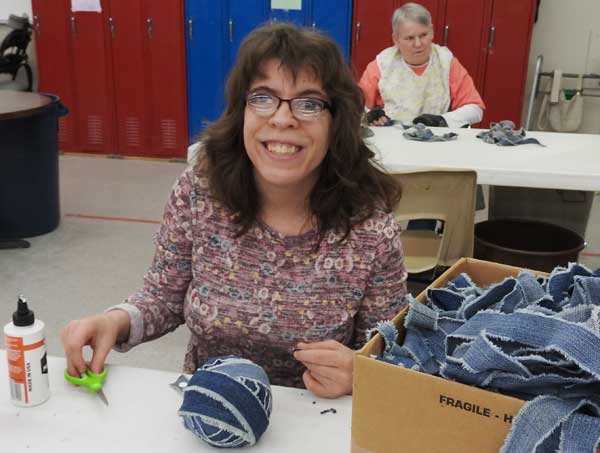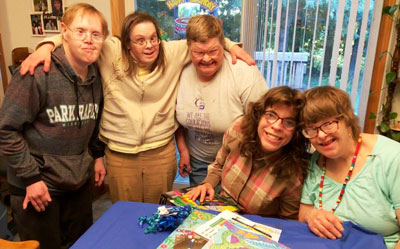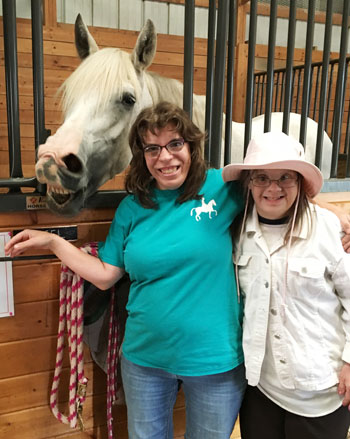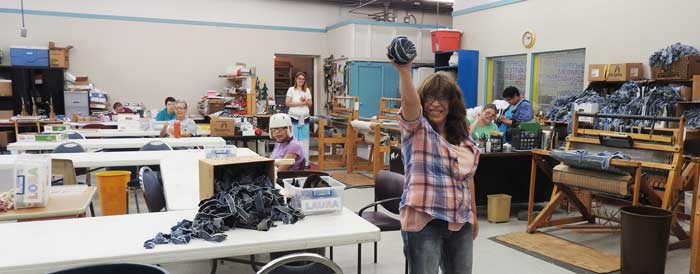Parent: Daughter should have right to choose work and home settings to best fit her needs

By Dawn Kovacovich, Hubbard County
My 28-year-old daughter, Laura Kovacovich is a special young woman who has asked me to share her point of view on what it means to be “fully integrated.” Laura was born three months premature with multiple disabilities including autism, Obsessive-Compulsive Disorder, and severe vision and hearing loss.
She has an outstanding memory, and with one-to-one paraprofessional support, Laura was able to successfully attend public school in a “fully integrated” setting with nondisabled peers. At the time, my husband and I felt that this model would provide Laura with the best education possible. However, due to the severity of her anxiety and social limitations, this would not have been possible without having one-to-one paras who provided daily communication with us and stayed at Laura’s side to provide needed assistance.

Many people think of integration only from the perspective of what they want for themselves. What they don’t usually think about is what it might feel like to always be in the minority. Our family observed how Laura absolutely blossomed every year when she attended summer camp with other autistic children. She was in a setting that was structured to meet her individual needs, and with staff and peers who understood and even celebrated her unique behaviors. We began to rethink what integration really means. From Laura’s point of view, the “integration” the general public seems to want for her is to remain in the minority rather than being a part of a majority of like-minded individuals.
This position was firmly recognized when Laura started working at the Hubbard County Developmental Achievement Center (DAC) and the “Bearly Used Thrift Store” in Park Rapids. After graduating, Laura was able to remain at her high school for one more year as a student worker. She loved her volunteer job in the office, sorting and delivering staff mail. It gave her a sense of purpose and she felt comfortable and happy.
However, when she started working in Park Rapids a year later; for the first time in her life, Laura was able to work in a setting where her like-minded peer group was the  majority and people without disabilities (her work supervisors) were the minority. She made close friends. She felt safe instead of vulnerable. She did not feel overwhelmed or pressured. When she needed help, it was immediately available. She was encouraged to try a variety of jobs, including rug making, filing, pricing, and shelving items. She chose the jobs she liked best and was regularly assessed for productivity at those jobs so that she would receive fair compensation for her work. There were developmentally appropriate events, exercise and creative opportunities and parties that helped create a strong sense of community and belonging. Instead of coming home quiet and subdued, Laura literally bubbled over with how much “I love my jobs!” every day. She started playing games with peers and asking to go on outings with others, which was a particularly remarkable step for Laura.
majority and people without disabilities (her work supervisors) were the minority. She made close friends. She felt safe instead of vulnerable. She did not feel overwhelmed or pressured. When she needed help, it was immediately available. She was encouraged to try a variety of jobs, including rug making, filing, pricing, and shelving items. She chose the jobs she liked best and was regularly assessed for productivity at those jobs so that she would receive fair compensation for her work. There were developmentally appropriate events, exercise and creative opportunities and parties that helped create a strong sense of community and belonging. Instead of coming home quiet and subdued, Laura literally bubbled over with how much “I love my jobs!” every day. She started playing games with peers and asking to go on outings with others, which was a particularly remarkable step for Laura.
In 2017, Laura held a sign that read “Handicapped Women Count!” and marched in the Women’s March in Bemidji, joining thousands of other women across the nation. Laura wasn’t marching just for the rights of women though, but for the rights of women with disabilities. She feels very strongly that she should have the right to choose her living and working space. It seems policymakers who do not have disabilities have decided that it is “isolating” and “segregating” to allow people with disabilities to live and work together. They have created laws that prevent licensing of assisted living facilities for the developmentally disabled, lean toward laws that push for “fully integrated” competitive employment, and have frozen the funding for group homes. Laura was invited to speak at the rally following the Women’s March and on Lakeland Public Television, where she eloquently shared how much her jobs at the work center have meant to her. A few weeks later, her message was shared in a front page article in the Park Rapids Enterprise. She recognizes that without a supported work setting, she would not be able to work at all. There are simply no appropriate settings and support systems in place in the general workforce that could meet her needs, much less an environment where she could make real friends and feel safe. 
Laura enjoys earning a paycheck at work because it makes her feel like a productive adult. She has very minimal understanding about finances and the monetary value of her paycheck means very little to her. Due to the severity of her disabilities, Laura has qualified for funding that provides for her living expenses. Earning minimum wage is not important to her, but having a productive and meaningful job in a developmentally appropriate setting is EXTREMELY important. She knows that if the 14(c) regulation is eliminated, her quality of life will change dramatically.
Because of a lack of fully supported housing options for developmentally disabled individuals, Laura waited seven years for an opening at Heartland Homes in Park Rapids. Up until then, Laura lived with us, her parents/guardians, in rural northern Hubbard County. During that time, we drove 50 miles, twice a day, to meet the DAC bus so Laura could continue to work in Park Rapids instead of remaining in isolation at home all day. When she was finally able to move into her new home, Laura truly felt like an independent adult. The house is fully staffed in order to provide necessary support, supervision, and transportation for its residents. But, just like any other adult person, having the choice and resources available to live independently from one’s parents is a right that Laura feels every person with a disability should be allowed. It was a huge and exciting step for her! She is part of the broader Park Rapids community now and has formed very close attachments to her housemates and caregivers.
Again, Laura feels very strongly that people with disabilities should have the right to choose their own home and work setting. This includes the right to live in an assisted living or group home facility for people with disabilities if that is the environment that best meets their needs. It also includes the right to choose to work with other people with disabilities in supported work settings or work centers for a special minimum wage. This option will not prevent other individuals with disabilities from working in less supported settings if they have those capabilities, but will accommodate people who need this structure. She is extremely grateful to enjoy a wonderful quality of life at this time and hopes that people will continue to honor her choices.